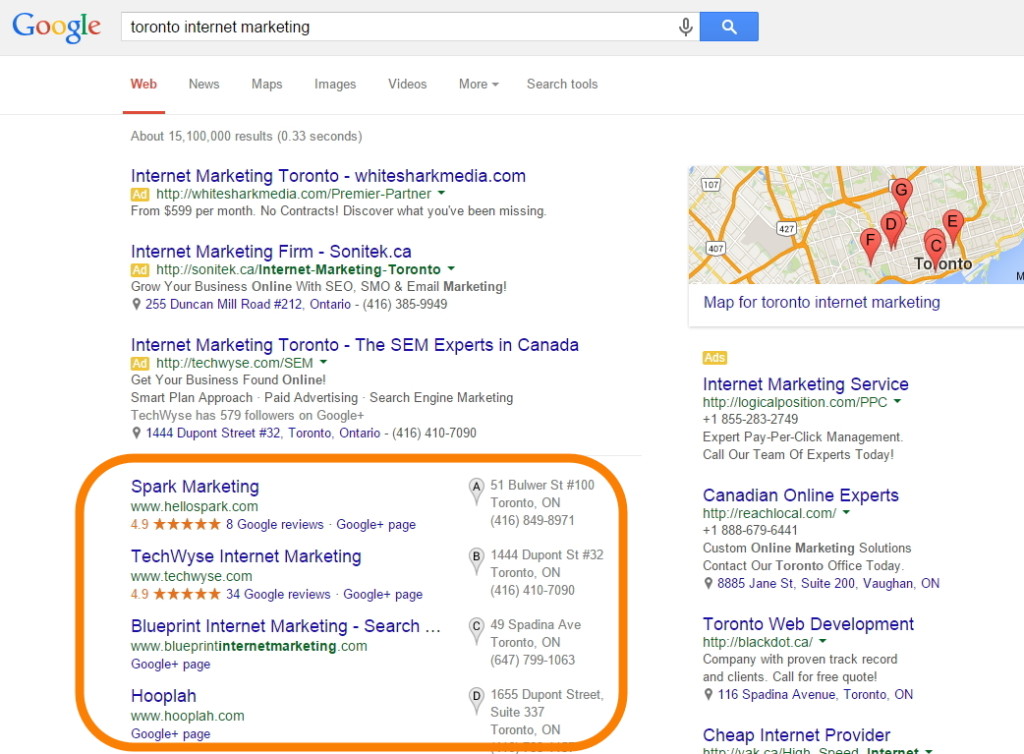
If you’re new to digital marketing, you might be feeling a little confused by the overwhelming amount of 3-letter acronyms we use. SEO, SEM, CRO, ROI, CPC, and YYZ (Ok that last one is actually just a song by Rush, and Toronto’s main airport code), but I’ve made my point: marketers have gone a little acronym-crazy.
So, to set the record straight, I’ve created a guide on two of the most commonly misused digital marketing terms, SEO: Search Engine Optimization and SEM: Search Engine Marketing.
SEO: Search Engine Optimization.
Search Engine Optimization refers strictly to the organic results in the Search Engine Results Page (SERPS). Organic results are the advertisement-free section of the results page, or the results that Google thinks best match what you are searching for. In the image below, you can see the organic section circled in Orange. Every other piece of real estate on the page is auctioned off to advertisers, but I’ll get to that later.

The entire purpose of SEO is to improve your site’s reputation in Google’s eyes, so that they will show your site ahead of the other alternatives when prompted with a search query. As you can see, for the query “Toronto internet marketing” Google has deemed Spark to be the most suitable, and has placed us at the top of the list. Nice.
So, how do we do it? The SEO process begins by creating a list of keywords that we believe your customers, or potential customers, are searching for. Then, we tailor your site to appeal to these searches, or queries. Keep in mind, Google factors in hundreds of variables to their judgment of your site, so it’s essentially impossible to be perfect; however, there are a few factors that we know are especially important. Domain age, content length, keyword density, and site speed are a few big ones. There’s also some more proprietary strategies that we’ve experienced success with, but if you’d like to know more about that you’ll have to give us a call.
Key Takeaway For SEO: Infinite Potential
Overall, SEO is a great way to attract new customers to your business. The biggest advantage with SEO is that when it comes to leads, the sky’s the limit. SEO might take a little longer to get rolling than other forms of digital marketing, but whether you receive 50 visits to your site, or 50,000, your costs will not increase.
SEM: Search Engine Marketing
Now that you’ve got SEO under your belt, let’s talk about SEM.
SEM simply refers to the results on the search engine results page that have paid to be there. In the image, this is everything above, and to the right of our orange box (not including the map). SEM is also commonly referred to as PPC (pay per click), or simply, paid search.
One of the common misconceptions with paid search is that the results are not as relevant as the organic results, which is a fair, but incorrect assumption to make. People typically don’t like to be sold to, however, Google actually does a pretty good job at making sure the paid search results are just as relevant for your query.
How Paid Search Works
Think of paid search like an auction, but, you can’t just pay with money (note: you will still have to pay with some money, though). At the Google auction, you pay with something called your Ad Rank, which is just a multiplicative function of the maximum price you’re willing to pay per click, and your quality score. Your quality score, if you’re unfamiliar, is simply a value of 1-10, which represents Google’s opinion of how relevant you are to the searchers of a certain key word.
Google will place advertisements on the page based on ad rank, in descending order. It’s also important to note that with paid search you will never be charged more than your max cost per click, but you may very well pay significantly less.
Key Takeaway For SEM: Cash Isn’t King
The one thing to remember with SEM, or paid search, is that cash is NOT king. You will need both strong relevance (quality score), and, of course, a reasonable budget. Having just one or the other will result in limited success.
This is where SEO and SEM differ. SEM can vary drastically in cost, as a poor quality score will end up costing you much more to gain the same visibility as a competitor with an average quality score, and lower budget. Equally important, if your quality score is really bad, you won’t get any visibility at all; no matter the size of your budget.
So What’s Best For Me?
As a member of the SEO team at Spark, I’m slightly biased on this matter, but the truth is it depends on a number of things; your industry, your goals, and your target consumer to name a few.
Want to find out what’s best for you? Give us a shout, we promise to use as few acronyms as possible.



